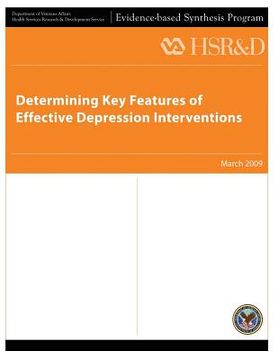Reseña del libro "Determining Key Features of Effective Depression Interventions (en Inglés)"
Current clinical guidelines for depression address depression treatment for patients detected in primary care; VA/DOD depression guidelines; and NICE guidelines. Research to date indicates that, under usual care conditions, less than half of primary care patients found to have major depression complete minimally adequate medications or psychotherapy. A variety of organizational changes aimed at improving care for depression in primary care have been tested. Yet evidence-based guidance for healthcare organizations and their primary care practices about which organizational changes are necessary for achieving improved depression outcomes is lacking. The purpose of this review is to establish a basis for organizational guidelines or best practices for achieving improved depression care. The collaborative care model for depression has been extensively studied, and found to be both effective and cost-effective in prior meta-analysis. Collaborative care models are organizational interventions designed to remedy known deficits in current depression care. These multifaceted models are loosely defined as involving collaboration between providers from different specialties to provide appropriate, timely depression care or as involving two of three types of professionals (a case manager, a primary care clinician, and a mental health specialist) working collaboratively within primary care. Thus, while all applications of this model are similar in focusing on supporting effective management of primary care patients detected outside of a mental health specialty setting, the specific features of the model vary from study to study. These variations make it difficult for care settings to know what features of the models tested and found to be effective in randomized trials of collaborative care are essential for achieving the expected effects. Collaborative care definitions like these have been directed primarily at staffing (e.g., the presence of case manager or mental health specialist). Current theories of chronic illness care, however, postulate that key additional organizational changes are required to achieve consistent, sustainable improvement. When the multiple facets of collaborative care models are considered, most can be considered specific applications of the general, across-disease chronic illness care model. This review focuses on high quality depression care randomized trials that involved at least one change in the organization of care as described in the chronic illness care model. Our main research question was whether there are specific design features of collaborative care interventions that are consistently associated with greater impact on depression symptoms compared to a usual care control group. We also aimed to explore additional outcomes including patient satisfaction and functioning. In addition, we asked whether there were specific design features of randomized trial evaluations of collaborative care that were associated with consistently greater effects. Secondarily, we aimed to assess whether any patient characteristics, such as comorbidities, were associated with differential collaborative care effects, and the degree to which model effects persisted over time. We investigated these goals based on the following research questions. 1) Primary Research Question: What is the core set of intervention features that characterize collaborative care interventions, and which additional features are most linked to enhanced outcome effects? 2) Secondary Research Question: Are there specific evaluation features among randomized trials of collaborative care that are associated with effect size differences, independently of intervention features? 3) Secondary Research Question: To what extent is collaborative care more effective than usual care for decreasing depressive symptoms among patients with comorbid mental health conditions (PTSD, dementia, anxiety, dysthymia, substance abuse) or medical conditions?

